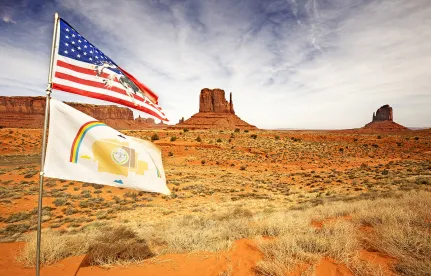Overview
On June 22, 2023, in Arizona v. Navajo Nation, No. 21-1484, the U.S. Supreme Court rejected the Navajo Nation’s claim that the 1868 treaty establishing the Navajo Reservation required the United States to take affirmative steps to secure water for the Tribe. In a 5-4 opinion written by Justice Kavanaugh, the Court reversed the U.S. Court of Appeals for the Ninth Circuit and concluded that, although it is well-settled that reservations of lands for Indian tribes implicitly include the right to use water necessary to accomplish the purposes of the reservation, because the 1868 treaty did not include language imposing an affirmative duty on the United States to secure that water, the Navajo Nation could not maintain its action for breach of trust.
Background
This dispute centered on access to water in the Navajo Reservation, which lies almost entirely within the Colorado River Basin and has three rivers – the Colorado, the Little Colorado, and the San Juan – on its borders. To meet their water needs for household, agricultural, industrial, and commercial purposes, the Navajos obtain water from sources within their reservation, but, like much of the western United States, face water shortages.
After the United States opposed the Navajo Nation’s motion to intervene in Colorado River water rights litigation and declined to quantify the Navajo Nation’s rights to that water, the Navajo Nation sued to compel the federal government to determine the water needed to meet the reservation’s needs and to devise a plan to meet those needs. The Navajo Nation’s claims were based on an 1868 treaty between the Navajo Nation and the United States. In that treaty, the Navajos pledged to make the reservation their “permanent home” and to relinquish their rights to occupy any other territory. The Navajo Nation argued that “permanent home” included a water supply adequate to sustain agriculture and livestock. According to the Navajo Nation, by failing to take affirmative steps to secure water for those purposes, the United States, which holds water rights in trust for the Navajo Nation, had breached its fiduciary duty. The Navajo Nation also noted that, under the special canons of construction that apply to treaties between the United States and Indian tribes, any ambiguity should be interpreted in favor of tribal rights.
Majority Opinion
The Court recognized that the 1868 Treaty reserved necessary water to accomplish the purposes of the Navajo Reservation under the Winters doctrine. However, the Court concluded that, to sustain its breach-of-trust claim, the Navajo Nation needed to identify the text of a treaty, statute, or regulation imposing on the United States an affirmative duty to secure water for the Navajo Nation. Although the 1868 treaty imposed certain affirmative duties on the federal government, including for the supply of seeds and agricultural implements for up to three years, it did not contain language recognizing an affirmative duty to secure water. According to the Court, although the United States has a general trust relationship with Indian tribes, including the Navajos, that relationship does not include “all the fiduciary duties of a private trustee,” and the Court would not infer a conventional trust relationship with regard to a particular trust asset (such as water) without express language creating that duty.
The Court also stated that, particularly in the “zero-sum situation” of allocating water in the arid regions of the American West, courts “must stay in their proper constitutional lane” and leave it to Congress and the President to enact water appropriations laws and update federal law to address competing needs for water. The Court noted that, going forward, the Navajo Nation potentially could assert their interests in water rights litigation, including by seeking to intervene in cases affecting those interests.
Justice Thomas concurred in the Court’s opinion but wrote separately to question the constitutional underpinnings of the trust relationship between the federal government and Indian tribes and the special canons of construction that apply to treaties between the United States and Indian tribes.
Dissent
In dissent, Justice Gorsuch, joined by Justices Sotomayor, Kagan, and Jackson, accused the majority of ignoring the history of the 1868 treaty, applying the wrong legal framework, and disregarding precedent. The dissent viewed the Navajo Nation’s lawsuit as a final attempt to compel the federal government to identify the extent of the Navajo Nation’s water rights and to formulate a plan to stop any misappropriation of those rights. The dissent noted that, in future litigation, the Navajo Nation potentially could assert claims based on direct interference with their water rights and suggested that principles of estoppel would preclude the United States from opposing the Navajo Nation’s future requests to intervene in litigation affecting their rights.
Take Aways
Although this case specifically involved the rights of the Navajo Nation, the Court’s decision is potentially informative whenever a tribe seeks equitable relief based on the federal government’s breach of its trust obligations.



 />i
/>i
